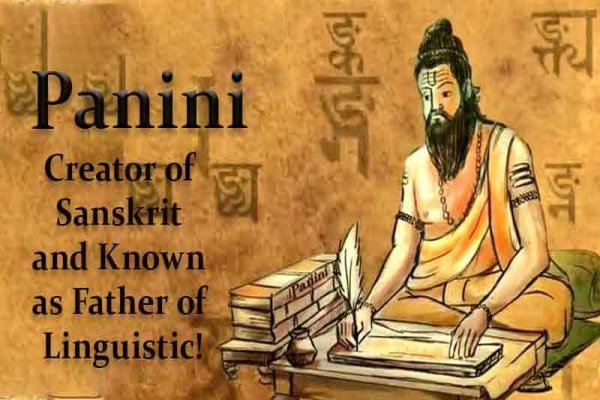Explore Gotras

Pāṇini: The Father of Sanskrit Grammar and Linguistic Science
Pāṇini, an ancient Indian scholar, is celebrated as the father of Sanskrit grammar and a pioneer in the field of linguistics. His seminal work, the Aṣṭādhyāyī, laid the foundation for the systematic study of language, influencing both ancient and modern linguistic theory.
1. Origins and Lineage
Historical Context:
Pāṇini is believed to have lived between the 6th and 4th centuries BCE, with scholarly consensus placing him around the 5th century BCE. He hailed from Śalātura, a town near the Indus River in the ancient region of Gandhāra, corresponding to present-day Pakistan. His education is traditionally associated with the renowned ancient university of Takṣaśilā (Taxila), a prominent center of learning during his time.
Lineage:
While specific details about Pāṇini’s family are scarce, traditional accounts name his father as Panini and his mother as Dakshi. He is often referred to as Śālāturīya, indicating his origin from Śalātura. imrjournal.infoWikipedia
2. Pāṇini’s Role in Ancient Indian Scholarship
Pioneer of Linguistics:
Pāṇini is revered as a pioneering linguist who brought scientific precision to the study of language. His analytical approach to Sanskrit grammar set a precedent for linguistic studies, earning him recognition as one of the greatest grammarians in history. siesoiop.in
Influence on Subsequent Scholars:
His work influenced not only Indian scholars but also modern linguists. Notably, Western linguists such as Ferdinand de Saussure and Leonard Bloomfield acknowledged Pāṇini’s impact on the development of linguistic theory.
3. Pāṇini’s Contribution to the Vedic Tradition
The Aṣṭādhyāyī:
Pāṇini’s magnum opus, the Aṣṭādhyāyī (“Eight Chapters”), is a comprehensive treatise on Sanskrit grammar comprising approximately 4,000 concise rules (sūtras). This work systematically codifies the linguistic features of Sanskrit, covering phonetics, morphology, and syntax.
Integration with Vedic Studies:
The Aṣṭādhyāyī is considered a part of the Vedāṅga, the six auxiliary disciplines associated with the Vedas. Specifically, it pertains to Vyākaraṇa (grammar), which is essential for the correct interpretation and recitation of Vedic texts. Wikipedia
4. Pāṇini’s Role in Hindu Tradition
Preserver of Sacred Language:
By systematizing Sanskrit grammar, Pāṇini played a crucial role in preserving the sanctity and purity of the language, which is integral to Hindu rituals and scriptures. His work ensured that the pronunciation and interpretation of sacred texts remained consistent across generations.
Spiritual Significance:
In traditional accounts, Pāṇini is often depicted as a sage (ṛṣi) who received divine inspiration. Legends narrate that he attained his profound understanding of grammar through penance and blessings from Lord Shiva, who revealed the foundational sounds of the sūtras through his cosmic dance.
5. Pāṇini’s Legacy in Hinduism
Foundation for Sanskrit Education:
Pāṇini’s grammatical framework became the cornerstone of Sanskrit education in India. His methodologies are still taught in traditional learning centers, ensuring the continuity of linguistic and cultural heritage.
Influence on Indian Intellectual Traditions:
Beyond grammar, Pāṇini’s analytical methods influenced various fields such as logic, philosophy, and literary criticism, showcasing the interdisciplinary impact of his work.
6. Pāṇini’s Influence in Global Linguistics
Model for Modern Linguistics:
The precision and structure of the Aṣṭādhyāyī have drawn comparisons to modern computational models. Its rule-based system resembles the formal grammars used in computer science, highlighting Pāṇini’s ahead-of-his-time approach.
Recognition by Western Scholars:
Western linguists have acknowledged Pāṇini’s contributions. Leonard Bloomfield, a prominent figure in structural linguistics, referred to Pāṇini’s work as “one of the greatest monuments of human intelligence.” siesoiop.in
7. Conclusion
Pāṇini’s meticulous analysis and codification of Sanskrit grammar have left an indelible mark on both Indian and global linguistic traditions. His Aṣṭādhyāyī not only preserved the integrity of sacred texts but also laid the groundwork for the scientific study of language. His legacy continues to inspire scholars, linguists, and spiritual practitioners alike.
